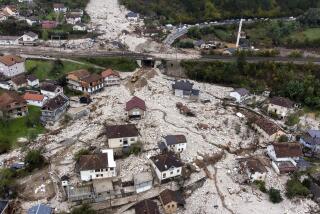Serbs Ignore Warning, Send Police to Kosovo
- Share via
PRISTINA, Yugoslavia — Ignoring U.S. warnings, the government of Yugoslav President Slobodan Milosevic has deployed several hundred additional police to the rebellious Kosovo province in what may signal the start of another offensive, Western officials said Thursday.
Reports of the buildup came one day after the six-nation Contact Group, which monitors Balkan conflicts, decided not to act on its threats to punish the Milosevic regime for a fierce crackdown on ethnic Albanian separatists in Kosovo earlier this month. More than 80 people died in that operation.
Washington and its European allies have demanded that Milosevic withdraw special police forces from the Albanian-majority province in southern Serbia. Instead of complying, Milosevic has dispatched additional police, and the special units are digging in, Western officials said.
U.S. and British envoys on a mission to Yugoslavia, composed of Serbia and the smaller Montenegro, on Thursday warned the government against continued police incursion in Kosovo and urged Serbian and ethnic Albanian leaders to begin a “meaningful, unconditional dialogue” immediately to avoid a wider conflict.
Robert Gelbard, the U.S. special envoy for the Balkans, said paramilitary police were reinforcing permanent and semi-permanent positions in Kosovo. These include sandbagged roadside checkpoints and sniper nests.
“They are clearly in positions they were not before,” Gelbard said at a news conference in Pristina, Kosovo’s capital, after a day of meetings with Serbian and ethnic Albanian officials in the province.
Gelbard and his British partner, Jeremy Greenstock, political director of the British Foreign and Commonwealth Office, said they failed to obtain “concrete assurances” from Milosevic’s government that police will be withdrawn.
Gelbard, Greenstock and their delegation met with Serbian President Milan Milutinovic, but Milosevic, in an apparent gesture of pique, declined to receive the envoys.
The apparent purpose of the visit was to soothe dismay among ethnic Albanians over the Contact Group’s inaction and to send a message to Milosevic that he still faces pressure. A statement issued Wednesday after the group’s meeting in Bonn included a threat to impose further sanctions on Yugoslavia but only after a four-week reprieve.
A senior U.S. official said the Yugoslav government, rather than withdrawing police, had added in “the last few days” several hundred Interior Ministry police officers to forces already stationed in Kosovo.
The ominous buildup around the town of Srbica may be in preparation for another assault, one that was probably delayed until after the Contact Group meeting, the official said. Srbica sits at the center of the area where clashes between police and separatists have been most intense and where members of the rebel Kosovo Liberation Army are believed based.
Throughout Kosovo, tensions remain high, sporadic shooting is reported almost nightly, and Albanians daily close shops and schools early out of fear.
In meetings with Milosevic earlier this month, and again Thursday with Milutinovic, U.S. envoys have raised the issue of alleged police atrocities. But the Serbian leaders displayed a “willful lack of understanding about the role of police” in a lawful society, the U.S. official said.
Meanwhile, Gelbard and his delegation Thursday also pressed for unconditional talks to be opened but said the Serbian side resisted. The Yugoslav government has sent a delegation to Pristina to begin a dialogue on the status of Kosovo but only as a province within Serbia.
The ethnic Albanians of Kosovo, however, want full independence--even though the West does not support secession--and have refused to participate in talks on the Milosevic government’s terms.
Ethnic Albanian leader Ibrahim Rugova, the self-styled “president” of Kosovo, earlier this week appointed a 15-member advisory council that eventually will evolve into a negotiating team--a development that Gelbard and Greenstock praised as an initial positive sign.
And Gelbard reiterated the U.S. government’s position that the status of Kosovo be debated as an autonomous entity within the Yugoslav federation, not a province within Serbia.
“This dialogue won’t last for long unless the international community is involved,” Greenstock said.
More to Read
Sign up for Essential California
The most important California stories and recommendations in your inbox every morning.
You may occasionally receive promotional content from the Los Angeles Times.











